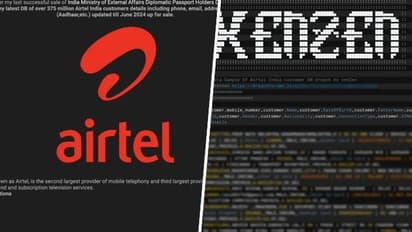Airtel refutes alleged data breach of 37.5 crore Indians, labels claims as 'attempt to tarnish reputation'

Synopsis
The alleged misinformation about a data breach surfaced when Dark Web Informer, monitoring activities on the dark web, highlighted a post by a hacker named 'xenZen'.
Airtel India firmly rebutted claims of a data breach on Friday following reports that personal details of over 37.5 crore Indian customers were being offered for sale on a prominent hacking forum.
“There has been an ongoing report alleging that Airtel customer data has been compromised. This is nothing short of a desperate attempt to tarnish Airtel’s reputation by vested interests. We have done a thorough investigation and can confirm that there has been no breach whatsoever from Airtel systems," an Airtel spokesperson was quoted as saying in an India Today report.
The alleged misinformation about a data breach surfaced when Dark Web Informer, monitoring activities on the dark web, highlighted a post by a hacker named 'xenZen'. The post purportedly offered a database containing sensitive information such as mobile numbers, dates of birth, father's names, Aadhaar IDs, and email IDs of Airtel India customers, with a price tag of $50,000 USD (approximately Rs 41 lakh) payable in cryptocurrency.
The hacker claimed that the breach occurred in June 2024 and purportedly provided a sample of the data. Additionally, xenZen asserted involvement in a previous breach targeting the database of diplomatic passport holders maintained by the Union Ministry of External Affairs.
While the existence of the alleged data of 37.5 crore customers in the hands of hackers remains uncertain, security researchers suggest it may not be fabricated. Nicolas Krassas, associated with Henkel AG focusing on cybersecurity, retweeted information regarding the alleged Airtel data breach.
Srinivas Kodali, known for his outspoken views on cybersecurity in India, offered more direct observations. “Airtel has been hacked by a China based threat actor. He listed 37.5 crore Airtel customer's data including their Aadhaar numbers for sale. The actor who listed this data for sale on breach forums, is now suspended on the forum. India's Data Protection Act is still not active," he wrote on X.
In 2021, cybersecurity researcher Rajshekhar Rajaharia raised concerns when details of over 2.5 million Airtel subscribers appeared on the website of a threat actor known as 'Red Rabbit Team'. The information was removed after three months. Airtel India had denied any breach at that time.
Moreover, databases of subscribers from other major Indian telecom companies like Jio and Vodafone Idea have also reportedly been compromised in the past. Such alleged exposures of personal user data could potentially lead to identity theft, financial fraud, unsolicited marketing calls, and other serious consequences for affected individuals.
Despite Airtel's denial of a system breach, it's crucial to acknowledge that data from Indian companies has been compromised or leaked previously. Whether or not you are an Airtel user, adhering to essential cybersecurity best practices is vital to safeguard personal information.
-
Regularly update passwords: Ensure passwords for all online accounts linked to compromised email addresses are frequently changed.
-
Monitor accounts: Regularly review bank and credit card statements to detect any unauthorized transactions.
-
Enable two-factor authentication (2FA): Enhance security by adding an additional layer of protection to online accounts.
-
Beware of phishing attempts: Exercise caution to avoid clicking on suspicious links or disclosing personal information to unverified sources.
Stay updated with the Breaking News Today and Latest News from across India and around the world. Get real-time updates, in-depth analysis, and comprehensive coverage of India News, World News, Indian Defence News, Kerala News, and Karnataka News. From politics to current affairs, follow every major story as it unfolds. Get real-time updates from IMD on major cities weather forecasts, including Rain alerts, Cyclone warnings, and temperature trends. Download the Asianet News Official App from the Android Play Store and iPhone App Store for accurate and timely news updates anytime, anywhere.